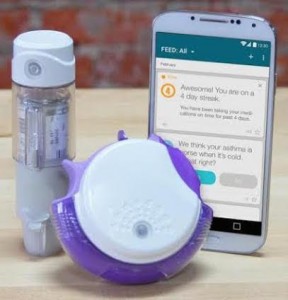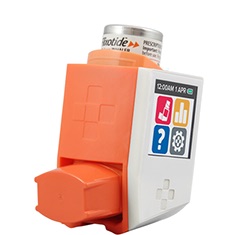Over the last two years, big pharma has gotten behind the idea of smartphone-connected inhalers for asthma and COPD in a big way. Two acquisitions, a $3 million investment, and a number of pilot and partnership deals have shown clearly that the space is of interest. (MobiHealthNews is helping to put on two pharma-related events at the mHealth Summit next week -- be sure to join us if you'll be in the DC-area.)
Inhalers hold a special appeal for pharma because they're a delivery device that already comes prepackaged with a drug. Asthma and COPD are both diseases where the biggest danger comes from attacks that can come on suddenly and unexpectedly, so collecting data on things like environment, air quality, and inhaler use can help patients and doctors learn to predict and prevent those attacks.
Read on for the five companies that are tackling this problem, and the pharma partners that they're working with.

1. Propeller Health (working with Boehringer Ingelheim, GlaxoSmithKline)
Founder David Van Sickle begin developing the technology for Propeller Health (once known as Asthmapolis) way back in 2009 at the University of Wisconsin-Madison. The original focus was on inhalers with GPS radios in them that would allow users to crowdsource data on where they were having asthma attacks, so they could identify areas with heavy air pollution. In September 2013, the company changed its name to reflect a broadening focus from just asthma to COPD as well. For COPD, the company shifted its focus from GPS tracking to tracking of adherence trends.
Propeller Health’s original system has been adopted by a number of providers since its 2010 launch, including Dignity Health in California, Amerigroup in Florida, and the City of Louisville. More recently, the platform has shown up at the Sharp Rees-Stealy Medical Centers in San Diego and as part of a trial with Qualcomm and Zephyr at Rady Children’s Hospital.
The company recieved two FDA clearances in September 2014 for two sensors designed to work with two particular inhalers on the market from major pharma companies: the Diskus inhaler from GlaxoSmithKline and the Respimat inhaler from Boehringer Ingelheim. Propeller has been working with Boehringer Ingelheim for more than a year. They announced that partnership at Health 2.0 in fall 2014 , including a pilot of the Respimat sensor. Boehringer and Propeller are working together on COPD. With GlaxoSmithKline, on the other hand, Propeller has no working relationship; it just built the device on its own as an add-on to GSK’s inhalers. The company has plans to make sensors available for a wide range of inhalers on the market.
 2. Gecko Health (now owned by Teva Pharmaceuticals)
2. Gecko Health (now owned by Teva Pharmaceuticals)
In September, Israeli pharmaceutical company Teva announced that it would acquire Gecko Health, a Cambridge, Massachusetts-based smart inhaler cap company. Gecko Health Innovations founders Mark Maalouf and Dr. Yechiel Engelhard will work with Teva to explore ways to apply the CareTRx technology to Teva’s product pipeline and portfolio of respiratory products with the goal of improving clinical outcomes.
At the time of the acquisition, Gecko’s main product was the CareTRx a platform for chronic respiratory disease management that combines a sensor device that connects to most inhalers, a data analytics platform, an accessible user interface, and behavioral triggers to help asthma and COPD patients manage their condition.
Like Asthmapolis, Gecko was one of the early entries to the smart inhaler space. The company began in 2012 as the winning team in an MIT Media Lab Health and Wellness Innovation event. The product that grew out of that event, called Gecko Cap, was aimed at kids and used gamification and rewards to help motivate them to use their inhaler.
At the start of 2015, based on feedback from doctors and parents, the cofounders decided to broaden their focus, both to include adults and to help with COPD as well as asthma. They launched the CareTRx brand to focus on these new areas, and are currently engaged in clinical trials with Vanderbilt Children’s Hospital and Boston Children’s Hospital. They also previously worked with the Cincinnati Children’s Hospital.

3. Adherium (working with AstraZeneca)
Adherium is another very early entrant into the space, founded in 2001 in New Zealand under the name Nexus6. But the company just started making headlines when it partnered with AstraZeneca in July, and got a $3 million strategic investment from the pharma company shortly thereafter.
Adherium’s Smartinhaler sends data on when medication was taken to mobile devices and desktop computers via Bluetooth. The platform is designed to help patients, caregivers, and physicians remotely monitor and manage patients’ adherence to their medication.
The program that AstraZeneca has created for patients with COPD and asthma will use smart inhalers to monitor patients’ adherence and then provide patients with personalized advice based on their condition and medication use. In the future, the company said the program will also likely incorporate additional sensors designed to monitor a patient’s condition and potentially assess a patient’s personalized risk factors.
Fewer than 50 percent of asthma patients adhere to their prescribed preventative medications, according to Adherium, but the company also said that in clinical trails, the smart inhaler increased adherence by up to 59 percent in adults and 180 percent in children with asthma.

4. Inspiro Medical (now owned by Opko Health)
Teva Pharmaceuticals, an Israeli company, bought American startup Gecko this year. But more than a year earlier, an American pharma company bought an Israeli startup for the same reason. Miami, Florida-based biopharmaceutical company Opko Health acquired Israeli smart inhaler company Inspiro Medical for an eight-figure sum in May 2014. The company planned to use Inspiro’s Inspiromatic technology to develop an app-connected inhaler that will be bundled with a forthcoming new drug for asthma, COPD, and cystic fibrosis.
The inhaler has features that make it easier to use including an active powder de-agglomerator to ease inhalation and a microcontroller that better times the delivery of inhaled drugs. A connected app could be used to give near realtime feedback and instruction on proper use of the inhaler as well as to access data from sensors contained in the inhaler and to send that data to physicians, caretakers, or parents. The inhaler performed better than the gold standard in a small trial last year, according to the company.
 5. Cohero Health (working with various provider groups)
5. Cohero Health (working with various provider groups)
Updated with new information from Cohero Health.
Finally, New York City-based Cohero Health hasn't announced any pharma partners yet, but it is deployed at several health systems including Mount Sinai Hospital, Dartmouth-Hitchcock Medical Center, and Connecticut Children's Hospital. The company's FDA-cleared platform includes an inhaler sensor, a mobile app, and a connected spirometer.
Cohero Health has sensors that fit over both rescue inhalers and controller inhalers, which are used daily as a preventative measure. Others working on similar offerings have primarily focused on connecting rescue inhalers. In addition, the ability to measure lung function with the spirometer (which just recently received FDA clearance) gives doctors and patients additional data compared to other connected inhaler companies.
The sensors send the data to the EHR, which allows caregivers to have a more complete view of the patients’ health. But the mobile app also uses the sensor data in a gamified incentives program in which the user can get in-app rewards and gift cards for consistently taking their medication.
MedCity News recently reported that CoheroHealth has plans to be deployed with four to five health systems by the end of the year. While MedCity News reported that the company's full commercial launch is planned for Q2 2016, Cohero Health told MobiHealthNews in an email that "we are actively engaged with several pharmaceutical companies, payors and PBMs, and hope to publicly announce our pilot activity with them by the end of the year."
Cohero Health has raised $2 million in a seed round led by Zaffre Investments (part of Blue Cross Blue Shield of Mass), BioAdvance, Three Leaf Ventures, and StartupHealth.
Mount Sinai also told MobiHealthNews it has plans to incorporate a smart inhaler into its ongoing trial with the LifeMap COPD app. They didn't say what technology they would use, but given Mount Sinai's existing relationship with Cohero Health it seems very possible it will be involved.

















